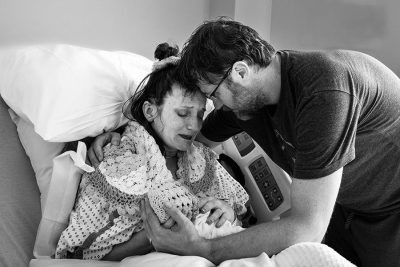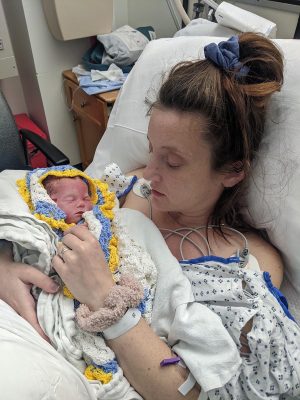SPECIAL INVESTIGATION – Banned from Care: Stillbirth Mother Recounts ‘Traumatic’ Termination from Optum/CareMount
Investigative / Enterprise In-depth examination of a single subject requiring extensive research and resources.
Opinion Advocates for ideas and draws conclusions based on the author/producer’s interpretation of facts and data.
This is the fifth installment in a series about Optum/CareMount and broader local healthcare issues.
Local Woman Endures Harrowing Healthcare Experience, Fraught Medical Records Fiasco
By Adam Stone
It’s impossible to overstate the level of heartbreak and trauma Katonah’s Rachel Krause has experienced over the past year.
Chapter 1 of this story actually starts on a happy, festive spring day nearly three years ago.
The sun was shining in Westchester on May 30, 2020, with temperatures in the 70s. Rachel was elated to tie the knot in her backyard the day before her 38th birthday with her longtime love, Sam Newbold, a software engineer.
For a few hours, during a modest but joyful ceremony, the newlyweds and their parents could try to forget about the raging pandemic.
That’s not to say early married life was easy for the newlyweds.
Sam, a Princeton University graduate and tech lead, and Rachel, currently a part-time teacher, caregiver and freelance artist, returned from New York City to their hometown of Katonah in 2021 to care for Rachel’s now 79-year-old mother, an Alzheimer’s sufferer, and Sam’s father, who was dying, ultimately passing at 83.
This video interview was conducted on Tues., Apr. 4 at Katonah Memorial Park by Adam Stone. Art Nelson edited the footage.
Dream Becomes Nightmare
~ Rachel Krause
There was also an arduous struggle for the couple with fertility issues; they began trying to conceive in 2018.
They were ultimately able to get pregnant by October 2021, thanks to in vitro fertilization.
By the time late May of last year rolled around, Rachel was preparing for a trio of fun events. She was pampered with love from old friends at her baby shower on May 29 – her first significant social event post-pandemic, finally public about her pregnancy – and was excited to celebrate her wedding anniversary the next day and her 40th birthday on the 31st.
But that’s when her dream of motherhood became a nightmare.
On the morning of May 30, her two-year wedding anniversary, and into her eighth month of pregnancy, Rachel awoke to every expectant mother’s worst fear – she didn’t feel her baby moving.
“We went to the hospital straight away and they confirmed that there was no heartbeat,” Rachel told me.
‘I Loved Being Pregnant’
Baby Ophelia Banklian Newbold had died inside of Rachel, and life would never be the same.
“Until that point, my pregnancy was going very smoothly and I actually felt great,” explained Rachel, who’d been a lifelong patient of Mount Kisco Medical Group/CareMount/Optum. “I loved being pregnant. I asked to have a day before being induced for delivery and because the following day was my 40th birthday.”

Anguished, Rachel still had a stillborn to deliver.
She went into labor, and she said her doctor encouraged her to have a vaginal delivery despite an undiagnosed placenta accreta – a complication that occurs when the placenta attaches too deeply to the uterine wall.
“Right before I started pushing hard, (my doctor) told me that I’d be a pro for next time and that I could try again in three to six months,” recalled Rachel.
But then difficulties erupted, imperiling Rachel’s life.
She lost more than 2.5 units of blood and required multiple transfusions, manual surgery, as well as interventional radiology.
While Rachel was fighting to survive, her fears were only heightened by the fact that her great-grandmother, an Armenian refugee and genocide survivor, died from postpartum complications, orphaning three children.
And on June 1, Ophelia’s lifeless body was delivered to a pair of adoring, emotionally-ravaged parents, including a mother who nearly died in delivery.
“We still don’t know why eternity took you back,” a grieving Rachel wrote in one online tribute to her late daughter.
For Rachel and Sam, the nightmare was just beginning.
Risky Business
Rachel said her doctor ultimately advised her that getting pregnant, staying pregnant and carrying a child would be very risky moving forward, and suggested adoption or surrogacy as safer bets.
But Rachel was intent on exploring pregnancy further.
She said her doctor promised to make referrals to high-risk pregnancy experts, known as maternal-fetal medicine specialists, or MFMs.
Interview with Rachel Krause and Sam Newbold on April 4, 2023
This audio interview was conducted by Adam Stone. Art Nelson edited the sound.
“She told me she thought Ophelia died from a cord accident and that autopsy might be able to confirm that,” Rachel said. “She promised me that she would make referrals to MFM specialists so that I could talk about what a future pregnancy looked like. I was reading like crazy, and knew that if I could find out where the accreta was, that perhaps, if I even could get pregnant again, I would be able to know if the placenta was attaching to a new spot in the uterus and therefore make the pregnancy safer. That’s why I wanted my records.”

Eventually frustrated by a lack of progress over a two-month period, Rachel decided to start reaching out to MFM specialists herself.
Meanwhile, life’s other challenges were only accelerating. Four days after being discharged from the hospital, with COVID fears in the air, Rachel’s 83-year-old father developed a high fever and was admitted to the emergency room with pneumonia, sepsis and Ehrlichiosis, an illness caused by bacteria, a series of events that Rachel characterized as “another level of hell.”
“I could barely walk but somehow separated him from my mom, slept outside his door all night and attended to him every few hours; he ended up in the hospital for five days with sepsis,” said Rachel, a former professor in New York City until 2016, teaching health communication, management and computer applications, among other topics. “Thank God, I didn’t lose him, too. That would have been it. It almost was.”
Fragility of Life
Just days after her father arrived home, Rachel recalls she felt “off.”
She returned to the emergency room, and on June 16 doctors discovered a pulmonary embolism, which is one of the leading causes of death postpartum, along with hemorrhaging and infection, as well as cardiovascular and mental health issues.
On June 20, doctors then discovered Rachel had a bladder infection. She also has a history of heart issues.
“I was ticking all the boxes,” Rachel said.
Rachel’s feelings about the fragility of life were more acute than ever.
Despite her physical and mental challenges, the desire to explore the pregnancy option persisted through it all.
As part of that desire, she’d been trying to obtain her records from the medical group for most of last summer, from June through early September, but to no avail.
‘Unethical’ and ‘Dangerous’

Frustrated, Rachel finally decided to e-mail the group’s top brass, including, among others, then-CEO Dr. Scott Hayworth, whose medical background is obstetrics and gynecology and is now Optum president. Current CEO Kevin Conroy was then president.
Rachel’s legal requests for her full pregnancy records were thwarted at every turn.
“I started the insurmountable task of trying to obtain my medical records,” she said. “I was told I didn’t (need) them. When I persisted, I was sent the wrong records over and over. I formally complained to the president of the medical center via e-mail.
Then, without warning, we got a letter from his chief medical officer: the entire medical center was terminating us as patients, giving us no notice or explanation.”
You read that right. Four months after the parents were left grieving for Ophelia, they were barred from receiving future health care from Optum. Many in the medical and legal community call termination a “discharge.”
In a case like this, when speaking plainly, it seems more than fair to call it a ban, bypassing the bureaucratic-speak.
“For good measure, we were banned from using any of their labs or urgent cares as well,” explained Rachel, who characterized the entire experience as “traumatic.”
“I was shocked,” she also said. “I’d been a patient there for 40 years and had a cardiac history. Terminating care, at that time wasn’t only unethical but dangerous.”
Dishonorable Discharge
~ Chief Medical Officer Lisa Bardack
I reviewed the letter Optum/CareMount sent Rachel on Oct. 4, 2022. What she claims checks out.
Her husband also received a similar letter. They were both banned.
Sam had been a lifelong patient at the group as well.
“We recommend that you promptly find other doctors to care for you,” the note from Chief Medical Officer Lisa Bardack asserted.
I asked Rachel if she’d ever lost her cool with the group’s medical team amidst canceled appointments and other pre-discharge frustrations she described.
“I did lose my temper on the phone,” she immediately acknowledged, referring to a conversation with the director of care coordination. “I told her that I thought she was interfering in my care and I begged her to stop. I told her to imagine that it was her daughter that almost died in childbirth and had a stillborn after years of infertility treatment.”
Rachel wasn’t done.
“I told her that I thought her telling me that I did not need my records was a violation of my patient rights,” Rachel said in an e-mail interview two weeks ago, before our first phone interview and in-person conversation last Tuesday. “I told her that canceling my appointments was infringing upon my ability to choose a doctor. I told her that I called her because I wanted to see just how bad it was going to get, because I was progressively horrified by what was happening there. She told me there was a team, undisclosed to me, working on ‘my case’ and that it wasn’t just her canceling my appointments.”
Matter of Records
What Rachel said she later concluded was that her stillbirth (and subsequent circumstances) apparently flagged her case for the medical group’s risk management team.
Rachel contends the euphemistically-named “care coordination” staff might have been guiding her with the Optum/CareMount administration’s legal considerations in mind, not just medical factors.
“It seemed like this ‘director of care coordination’ was told by legal or risk management to get me to stop requesting records,” Rachel told me.
It’s worth noting how healthcare organizations must maneuver around very real and gargantuan legal challenges trying to practice medicine in such a litigious society.

Most reasonable stakeholders would agree that it’s essentially become impossible to manage patient care in our current system without being extraordinarily mindful of malpractice suits, frivolous and otherwise, along with other potentially crippling financial and operational threats.
I asked Rachel to share with me the e-mail she’d sent to the medical group, the one where she pleaded with Hayworth and the other company leaders for her records.
(Hayworth previously served as a clinical assistant professor of obstetrics, gynecology and reproductive services at the Icahn School of Medicine at Mount Sinai, and is currently a member of Arsenal Capital Partners Healthcare Advisory Board. Arsenal is a private equity firm).
“This is the third (HIPAA) release I’ve had to fill out in six weeks and the sixth attempt at obtaining the records since June,” Rachel wrote in last year’s Sept. 6 e-mail plea to the medical group’s leaders, referring also to her non-binding verbal requests, and earlier attempts starting last June to access documents on the patient portal.
(HIPAA is short for the Health Insurance Portability and Accountability Act, a 1996 federal law that established national standards to protect sensitive patient health information).
The Camel’s Back
Rachel was specifically seeking and requesting pregnancy records – all clinical notes and images/ultrasounds dating back to Oct. 20, 2021, at about the start of her pregnancy.
Because she’d been having such trouble obtaining her records, she mentioned in her message to Optum/CareMount leadership how she wanted to follow up by sharing with them the HIPAA release form she’d left with the office earlier that day, last Sept. 6, in the form of an e-mail attachment.
And in what speculatively might have been the straw that broke the camel’s back for the medical group, Rachel cited legal code in her Sept. 6 e-mail, pointing to law that prohibits obstruction of criminal health care investigations.
~ Rachel Krause
“May I remind you,” she simply wrote, before copy and pasting the criminal code, Section 1518 of Title 18.
“I’m just astounded that he had experience with OB/GYN and that they would do this to someone with the risks I had postpartum,” Rachel said about Hayworth in a phone interview. “To me, that seems so inhumane, unethical, dangerous. I thought that by contacting him, he would be able to help improve the situation.”
Emotions Run High
Sam also wonders whether an in-person meeting last September, when Rachel was “very angry,” still seeking her records from staff, could have been a contributing factor to the medical group’s decision. There was emotion on Rachel’s part but no cursing or threats or anything at all along those lines, the couple emphasized.
“The records person was unwilling to talk to me directly about why I was there, would not look me in the eye and when she saw my name on the form she vanished rapidly,” Rachel remembers of the puzzling encounter.
It was the same day she saw an e-mail, by happenstance, that confirmed how a medical group clerk was apparently ordered to provide mammogram records to Rachel instead of the OB/GYN pregnancy records she specifically requested.
She said she was naive to the risks of mentioning what could be perceived as a legal ultimatum in the Sept. 6 e-mail to the company chiefs.
Through the process of trying to obtain her records, Rachel said she was told by the director of care coordination that she did not need the records, and that doctors discouraged it because she “wouldn’t be able to understand them” and did not have the software needed to read the disks.
“But I actually did have it because I taught college-level courses in electronic records and health communication,” Rachel said.
Stonewall

Despite attempt after attempt in writing and over the phone last summer, specifying her specific desire for pregnancy records, Rachel said she received mammogram records in the mail instead on two separate maddening occasions, on or around Aug. 20 and again on about Sept. 1.
In one of Rachel’s more explosive accusations, she told me she received confirmation from a source inside of Optum/CareMount last summer that she was being stonewalled.
“Finally, someone who worked there called me from their personal cell phone,” Rachel said. “The insider told me that I was right, they were intentionally sending me records I wasn’t requesting. The clerk was being given orders to send mammogram images instead.”
I was able to review an early September internal e-mail correspondence that confirms Rachel’s claim that a clerk was directed by superiors to specifically provide breast imaging, and not the pregnancy documents Rachel clearly and repeatedly requested.
The correspondence does not reveal anything explicit about intent or a motive. But it’s important to understand how the unnamed insider source framed her decision to reveal what she knew when reaching out to Rachel.
“She said, ‘I’ve been fired from jobs before,’” Rachel relayed to me when we met in person last Tuesday, saying how the highly principled source was taking a personal risk. “…So this was something that she felt she needed to tell me, and she was willing.”
She also said the source told her she “could subpoena the clerk” and that she was “risking her job by calling me.”
Rachel stresses, when casting blame, how the quality of care she received from doctors seemed extraordinary.
“I don’t think the doctors did anything wrong, unless that is, the records I had to fight for were tampered with,” she specified. “The wrongdoing, in my opinion, was the way I was handled by the director of care coordination and the records/radiology department.”
The $64,000 question is who directed that handling – and why was it handled in the way Rachel has documented.
‘This is Like a Red Flag’
A local legislative staffer I spoke to several times in recent weeks said if Optum/CareMount was in fact resisting the records request, as Rachel believes, reasonable people might speculate about a malign motive from administration.
“The lawyer in me is saying this is like a red flag,” said the staffer, who requested anonymity. “She should probably be speaking to a medical malpractice attorney. It makes me wonder if there were medical errors that caused stillbirth or something like that. All of a sudden, I’m like, ‘this is like some Erin Brockovich type of shit.’”
In the process of reporting on this story, in a series of unusual events, the issue of patient protection eventually reached the desk of Assemblyman Chris Burdick (D-Bedford).
Last week, to my astonishment, a series of conversations led the assemblyman to take impressive and swift action: you’re hearing it here and now first, Burdick submitted a bill on Apr. 6 that is designed to address a situation like Rachel’s termination, after hearing about our reporting.
Legislation Introduced
Burdick’s bill aims to establish obligations for physicians and medical groups when terminating a relationship with a patient.
If the bill becomes law, healthcare providers would be required to provide patients with at least 30 days of discharge notice, which strengthens the muscle of existing regulations that demand the same.
But the bill would also require medical groups and their doctors to renew existing prescriptions (if medically appropriate) for terminated patients while also mandating that providers offer discharged patients a medical plan to help guide future care.
In addition, the bill requires health care providers to give patients a list of referral sources to help their discharged patients find new physicians.
Burdick will now be trying to gain support from fellow lawmakers – and ultimately the governor – to get the bill passed.
While nothing is ever a guarantee, it’s reasonable to imagine the bill gaining momentum this spring, or even the possibility that the executive branch would just preempt the legislative process and enact the common-sense reform administratively this year through new regulation.
Medical Powerhouse
That said, Burdick remains wide-eyed about the fact that segments of the medical establishment will almost certainly resist or object to any policy that tightens regulatory control.
Optum, which is owned by intergalactic insurance giant UnitedHealth, is a massive and growing company with plenty of lobbying prowess.
To give you a sense of scale, the company just closed a nifty $5.4 billion deal a month-and-a-half ago to acquire LHC Group, a home health and hospice provider.

The Mount Kisco-headquartered CareMount, before being acquired by Optum in 2021, was trumpeted by Hayworth as the largest independent multispecialty medical group in the United States.
On Dec. 4, 2020, 264 CareMount shareholders – the healthcare group’s doctors – signed away their ownership stakes in the enterprise and joined what became Optum Tri-State as subordinate employees, my coverage from earlier this year revealed publicly for the first time.
Optum Care, for its part, has 60,000 doctors in 2,000 locations across the country, serving more than 20 million Americans, according to its website.
This one private business apparently treats 6 percent of the U.S. population, a far cry from the days of the neighborhood doctor hanging a shingle, hiring an office manager, treating the community and spending more than five to 10 minutes with patients when necessary.
‘Upsetting, Emotional Separation’
If the bill is enacted as currently written, it would take effect 60 days after becoming law.
“When this physician-patient relationship is terminated by a doctor or medical practice it can be an upsetting, emotional separation from the patient’s point of view and this legislation will provide the patient with the safeguards,” a bill memo proclaims.
I had the chance to speak with Burdick about his bill last week.
“Well, first of all, one hopes that this situation does not arise with frequency,” Burdick said. “But if it should arise where a practitioner terminates the patient-client relationship, then my feeling is that the transition to a successor should be made as smooth as possible, and during that time, the patient’s interests are being attended to. That’s the intention behind that. And you can see the steps which we would be requiring of the practitioner to ensure that that takes place.”
In fact, as chance would have it, Burdick told me he had a meeting scheduled for this past Thursday with Conroy, the CEO, to discuss the broader concerns of his constituents about a variety of issues at the medical group.
“They know why we’re calling; they know why I want to meet with them,” Burdick told me in a phone interview a few days before the meeting. “I’m sure they’re going to be prepared to say, ‘This is what we’re doing, this is who we’ve hired to deal with this. This is the timetable.’ And I’m sure that’s what they’re going to do. But I want specifics. I want to hear, ‘This is how we’re dealing with it. This is what we have done.’”
Meet Sam
I met Rachel and Sam at a park in Katonah last Tuesday, along with contributing Examiner photographer/videographer Art Nelson.
I’d already spoken with Rachel several times, electronically and over the phone, but it was my first real interaction with Sam.
Although he holds a degree in physics and computer science from Princeton, Sam, 43, struck me as humble, exceptionally thoughtful and adoring of Rachel.
Rachel, like Sam, is deeply intelligent.
She also seemed incredibly sincere and principled while also beset with emotional exhaustion, still navigating the aftermath of profound loss and subsequent trauma.
One point Sam stressed was the time sensitivity of Rachel’s desperate pleas for her records.
“Further delays impact whether our…parents will get to meet and help raise their grandchildren or whether we will ever be able to have children at all,” he said. “We needed to be getting the details of our case to the experts who could explain the likely outcomes of our options. Instead of being able to focus on these problems and our grief, we had to make numerous additional attempts to get the medical records to the people who needed to have them, and then pause to find all new physicians to treat our other existing medical issues.”
(Dark) Comic Relief
Rachel and Sam, who are not currently pursuing or planning any legal action, did previously get a medical expert to review their case.
But, as Sam told me, the takeaway was that the “medical professionals involved met the standard of care in every significant case, and multiple times they went above and beyond, striving to give us better outcomes than are normally expected.” More on that in a moment as well.
In a somewhat light moment toward the end of a highly emotional interview, Sam and I noted how the dramatic episodes would make for a compelling and impactful movie.
“Optum’s systems are so bad that at times it’s darkly funny,” Sam told me the next day. “Despite having been discharged from care two months earlier, I got a happy holidays e-mail in December, nominally signed by Scott Hayworth, stating in part, ‘we express our appreciation for trusting Optum with your health care. Serving you is our highest priority. If you or a loved one need an Optum health care provider, our urgent care locations are available to get you back to feeling your best.’”
Medical Business
The quality of treatment delivered by doctors, and the separate role of the business administration, reside in very different buckets of debate when unpacking this story, as do many Optum/CareMount controversies.
Because medical groups are legally empowered to discharge patients with almost unencumbered discretion, Sam wonders whether the administration just weighed the cost-benefit ratio, and determined it was prudent business and legal risk calculation to give him and Rachel the boot.
“I read that patients are discharged whenever a medical group thinks it is going to be sued,” Sam said. “In New York State you cannot bring a malpractice case unless a medical expert identifies some merit to the claim. This left me guessing that the administration and legal departments had no faith that their doctors were providing adequate care, even when they were providing care that went above and beyond current standards.”
Sam, in an e-mail conversation, even referenced the exclusive reporting I had published in mid-January about a restrictive noncompete the medical group had its doctors sign. He noted how part of the argument from the medical establishment, when trying to ethically justify noncompete requirements, is that the employment contracts help ensure continuity of care for patients.
Given what he and Rachel endured, Sam said that logic rings hollow.
“My wife was seeking to get medical records to the experts that her OB/GYN said she should have review her case in order to find out how we should pursue building a family, as well as receiving follow-up treatment for her pulmonary embolism,” Sam remarked. “At this time, Optum suddenly terminated her ability to see not just these doctors, but also the primary care physician she had been seeing for her entire adult life, the cardiologist she has seen for a decade and the doctor treating me for asthma.”
Setting aside the legalities, how could it possibly be ethical, regardless of the circumstances, to kick patients like Rachel and Sam to the curb without even the common decency of an explanation?
‘Our Care was Severely Curtailed’
Sam also said the couple was “told that this was a decision of the administration and legal departments, though I suspect that (a source) wasn’t supposed to admit that to us.”
Never receiving an explanation as to why they were discharged is also relevant to the way Rachel and Sam are forced to think and talk about their case. The couple wishes they weren’t required to speculate on any aspect of the situation.
Yet you can’t logically blame people for speculating when you keep them in the dark on the most central details.
As for how the 30-day notice they received played out in real life, Sam said the legal period of time did allow him to get certain prescriptions refilled, while some of Rachel’s doctors reached out with referrals, and a senior OB/GYN held a first and last meeting with the couple to review the pathology report – a meeting that Sam said took place only after a nurse acquaintance called in a favor for the couple.
However, the 30 days weren’t without serious hiccups.
“All of the appointments that we tried to make during that month were canceled without explanation, and several appointments that Rachel made before we got those letters were similarly canceled,” Sam said. “So, officially, we were given a warning about an upcoming termination of care, but in practice our care was severely curtailed before we were given any indication that something was happening.”
Any Word?
In fact, Rachel never received a response to a written request she sent after her discharge, begging for a three-month extension to find new doctors.
“Without receiving regular medical treatment for these conditions from my current specialists, I will be at risk of suffering serious medical complications while attempting to transition my care,” Rachel explained in her Oct. 10 letter to Hayworth and Bardack.
Crickets.
In our hour-long meeting last Tuesday, Sam elaborated about the meeting he and Rachel were able to secure with the senior OB/GYN.
“When we felt like we’d asked everything else, we asked, ‘Why was our care terminated?’” Sam remembered. “And she was the one who said, and I remember some of it, and I’m not entirely sure whether she went one step beyond, but she said it was the decision of the administrative and legal departments.”
At least according to Sam’s secondhand account, the discharge decision wasn’t initiated by one of the exceptional, deeply caring doctors who helped save Rachel’s life.
Seems to make sense.
Space/Time Continuum
Anyone who might follow this column knows The Examiner has dedicated a considerable amount of time and space in recent months chronicling a laundry list of complaints about Optum/CareMount, lodged by patients publicly and doctors privately.
In fact, one piece I prepared included reporting about a woman and her 95-year-old mother, an Alzheimer’s patient and stroke victim, who were also discharged by the medical group, partially related (as far as the patient could surmise) to her making unwelcome demands inside the patient communications portal.
However, we didn’t feature that case prominently or extensively because of off-the-record details I still can’t reveal.
Our coverage of the medical group since December has uncovered doctor frustration over the aforementioned restrictive noncompete agreement, patient unrest over a troubled phone system and a variety of concerns around the difficulty of getting appointments, billing snafus, physician shortages and a corresponding emergency room crunch at Northern Westchester Hospital.
The coverage also examined the medical group’s lobbying of the state on Medicare-related issues, as well as the organization’s hiring of security at Optum/CareMount’s Mount Kisco urgent care location to address simmering tension from irate patients.
Sorry Not Sorry
The Examiner has been far from the only megaphone. Patients from across the region took to social media to condemn the medical group, speaking out in seemingly larger and larger numbers in recent years.
The chorus of complaints seemed to hit a fevered pitch late last year into 2023.
By Feb. 20, Conroy, Optum Tri-State’s new CEO, finally sent a letter to patients outlining steps on how the company plans to improve service at the local health care giant, including by adding physicians.
He stopped short of an apology.
“First and foremost, I would like you to know that we have heard you and that our team is well aware of and appreciates your concerns,” the new Optum Tri-State CEO stated in the letter.
Anecdotally, I will say I’ve been hearing from some patients that they are starting to see some noteworthy enhancements around the edges in recent months, within areas like the group’s famously problematic phone system and otherwise, although serious complaints also persist.
Conroy has a background in the business side of medicine, working as the chief financial officer of CareMount for more than seven years, until March 2021.
His name is on the public documents from my earlier reporting about CareMount’s Medicare-related lobbying efforts.
Corporate Gobbledygook

Last week I connected over e-mail with Optum Senior Director of Public Relations and Corporate Communications Julie Robinson-Tingue.
She apparently wanted me to provide details of the case in writing in advance of her organization committing to a phone conversation, or even a prepared statement; I was only willing to put the details in writing as part of an interview process.
That said, I did offer to provide all the details in a phone conversation, allowing her the option to then schedule a follow-up e-mail or phone interview to answer.
It seemed fair to give her and her colleagues time to research details before answering.
In fact, I also e-mailed her eight generic questions, asking about the company’s policies around medical records access and patient termination.
But after I declined to provide the details of the case in writing, with no commitment of a follow-up e-mail or phone conversation, I got ghosted.
You be the judge of what was going on there.
Optum’s press office previously stopped responding to our requests for comment. Last week’s episode was actually the first time we were even able to establish contact since late 2022.
Before I began writing about the medical group, Examiner freelance journalist Sherrie Dulworth was assigned last summer to poke around on the story, and she was able to obtain prepared remarks from the Optum press office.
“Our goal is to deliver the right care, at the right time and in a way that results in the best outcome for our patients,” concluded a portion of the contrived Sept. 8 statement, attributed to Hayworth and Conroy.
In fact, it was Sherrie who posted a message to local social media community forums last August, including on the Nextdoor site, seeking patients who’d be willing to talk on the record about their medical group experiences, good or bad.
Rachel liked the post, and Sherrie then pinged her with a direct message.
Ready to Talk
At the time, Rachel wasn’t ready to go public. But on Jan. 10, Rachel did eventually post about her experience.
“Who here has had their care suddenly terminated by Optum (formerly known as CareMount) suddenly and without explanation after being a patient there for many years?” Rachel began.
The post generated a robust response, with 138 comments.
But it wasn’t until two weeks ago, on Mar. 24, that Rachel reached back out to Sherrie.
That’s when Rachel and I started talking.
Since then, I’ve spent about 70 hours interviewing sources, reviewing documents, reading related correspondence and conducting general research on the topic.
Coincidentally enough, just last week I also heard back from the New York State Department of Financial Services on a Freedom of Information Law (FOIL) request I submitted on New Year’s Day. In short, my request for relevant documents about the wider medical group issues was denied because my FOIL was too broad.
“As a result, finding the records that you request about patients of Optum/CareMount would require a manual search, reading through all of the complaints that the department received in 2022, which amounts to tens of thousands of records,” Brenda Gibbs with the Office of General Counsel stated in a lengthy e-mail last Monday.
Fair enough. I’ll be narrowing and revising the request.
Accountability
To learn more generically about potential accountability for bad behavior by health care providers, I spoke to attorney Fran Ciardullo, a legal expert on health care and risk-management issues who advises providers on how to remain compliant with patient access laws.
A lawyer with Barclay Damon, a firm with offices along the East Coast and Canada, Ciardullo was herself a former risk-management counsel for the largest medical malpractice insurer in New York State.
One detail I learned in a more than hour-long phone conversation with Ciardullo two weeks ago was how a private medical group can discharge a patient with essentially total discretion.
“As long as you’re not discriminating against somebody based on human rights categories, those protected categories, you can discharge someone for any reason,” Ciardullo said in our phone interview.
While it makes perfect sense for private establishments to maintain incredibly wide latitude in discharging abusive patients, there’s nearly no nuance in the law to protect patients from bad actors. (It’s also worth noting how doctors are subject to abandonment law when there’s unilateral termination of the physician-patient relationship without providing adequate notice.)
In terms of a medical group, even if theoretically the motivation for discharge is financial in nature, such as a concern about potentially getting sued for malpractice, the organization maintains what usually seems to amount to total protection to enact that non-medical business decision.
Ask the Ethicist
But a medical ethicist I spoke to was stunned by the details of Rachel’s claims, and characterized a discharge like the one described as unambiguous abandonment, at least from a plain English, ethical standpoint.
In cases where abandonment causes real harm, from a legal standpoint, a victim can pursue a strong medical malpractice suit.
Rachel had every legal right to her medical records, the ethics expert said, and the intentional withholding of accurate information is both unethical and, to use the source’s word, “insulting.”
The expert – who requested anonymity – said there may be cause for legal action and questioned the medical group’s justification for dismissing the patient from care.
My source also noted the issue of distributive justice in the case and expressed concern about the medical group’s treatment of patients with legitimate complaints.
“In an effort to protect and promote her autonomy she should have access to any and all information obtained in the course of her professional relationship with the physician,” said the veteran medical ethicist, who required anonymity in order to speak freely on the topic. “If, in fact, she knows that someone – from the ‘inside’ – has acknowledged that this ‘error’ was intentional, she has cause for litigation. Citing the twin principles of non-maleficence and beneficence, it is clear that she was treated maleficently.”
Patient Protection
While granting doctors and medical groups incredibly wide leeway to discharge remains righteous generally speaking – doctors shouldn’t be obligated to treat abusive patients – there are circumstances where the law leaves patients unprotected from potentially malicious private enterprise. (This is a point Ciardullo and I cordially debated; in short, she believes the law does protect patients because patients are provided notice during a discharge, and can be treated by a medical group in emergency situations during the transition period, and can also seek care elsewhere.)
But, as a practical matter, based on how seeking care works in the real world, someone like Rachel can be legally placed in danger by a discharge, the way I see it.
Ciardullo also stressed how in most situations, medical groups and individual doctors are incentivized out of self-interest to fulfill records requests.
Delays and mishaps are usually due to human error or other more benign factors.
The bottom line shorthand is this: Americans have the legal right to access their medical records.
“So a patient has a right of access to their medical records both under federal and state law, and it is up to the provider, whether it’s a facility or whether it’s a private medical group, to comply with that,” Ciardullo said. “And under HIPAA, there are specific time frames for complying with that. And you generally have 30 days.”
Legal Leverage
I reviewed the three HIPAA health information release forms Rachel submitted in writing, seeking her pregnancy records. The first was dated July 28, the second was dated Aug. 24, and the third was dated Sept. 6, 40 days from her original written HIPAA request.
It’s relevant to note how the somewhat long 30-calendar-day window (sometimes medical groups provide themselves with an additional 30-day extension, meaning 60 days can be acceptable) understandably exists in order for burdensome requests to be accommodated by often overwhelmed records departments.
The fact that Rachel’s request was straightforward, clear and non-exotic is germane to the circumstances.
When a patient believes their rights to personal medical records have been violated, they can file a HIPAA complaint, and might possess strong legal leverage.
So what about a records access case like Rachel’s, I asked Ciardullo, if a patient is, say, absurdly getting sent mammogram records instead of the pregnancy records they are clearly asking for and all the rest?
“I wouldn’t feel comfortable having you quote me on that,” she replied politely, stressing how she understandably can’t comment on a particular case. “You could probably answer your own question.”
Getting an Education

I first found Ciardullo after reading a post she wrote about a 2020 case where a medical practice paid $100,000 for failure to provide timely access to patient medical records.
She noted how individual health care providers can be charged with professional misconduct under the Education Law, which could potentially affect their license to practice. (Doctors get licensed through the state Department of Education in New York).
“There are also civil penalties under the Public Health Law but it would be extremely rare for those to be invoked, as virtually all providers are aware of the requirement to provide access, the maximum penalties are relatively small, and the government would have to bring an action to recover the penalties,” explained Ciardullo.
There is a real balancing act involved for health care providers in relation to medical records – a need to both protect patient privacy and confidentiality while also sharing medical information and records with other providers and organizations as part of ongoing patient care.
In terms of recent changes in related health care laws, Ciardullo highlighted the CURES Act’s information blocking rules, which aim to increase data interoperability across electronic health records and apps.
As a matter of fact, to this day, Rachel remains unsure if her new providers (she’s still searching for some after the Optum/CareMount discharge) have all of her records.
“I was able to obtain my records eventually, and at great cost to my health and well-being,” Rachel noted. “When I did obtain them and organize them, I was not sure they were complete. I had doubts because of how I was handled. I had to hire a medical expert to verify that they seemed complete in December.”
“I shared the records I could get with new doctors,” she also said. “I know that providers outside of Northwell do not have access to Optum or Northwell’s system but do share records with each other via MyChart or some version of Epic, I think.”
MyChart provides patients online access to portions of their medical records while Epic is an electronic health records system for hospitals and large practices.
Northern Westchester Hospital in Mount Kisco, where Rachel delivered, is a Northwell facility. Rachel only gushes with glowing comments about the hospital.
A Bit More Wonk
When it comes to enforcing HIPAA regulations, Ciardullo told me court cases are rare due to the high cost and burden of proving financial damages.
Instead, most activity is driven by HIPAA enforcement via the Department of Health and Human Services.
In 2019, the Office for Civil Rights (OCR) announced an initiative to enforce patients’ right of access to their own health information in a timely and reasonable manner.
To date, OCR has settled more than 40 “right of access” investigations with financial penalties imposed of more than $1.5 million nationwide, Ciardullo said.
The practice does not have to provide a reason for termination, but Ciardullo recommends that something general be stated, such as nonpayment of a bill, or a disruption in the physician/patient relationship.
In fairness to health care organizations, it’s important to stress how they are, as Ciardullo put it, “bombarded with medical record requests” and must remain mindful of rules around confidentiality, federal and state interplay, not to mention the confusing nature of some requests.
“All sorts of individuals and entities want copies of records,” she noted.
She stressed how a failure to quickly provide records is rarely “deliberate or willful,” but more likely due to “an administrative issue in processing the request.”
Right Fight
– Rachel Krause
But in terms of Rachel’s case, she provided records to me that document her clear, repeated requests for pregnancy records.
“This is a violation of my patient’s rights,” Rachel wrote to Optum/CareMount in the margins of one of the follow-up HIPAA health information release forms she showed me, also noting in the document how it was her third time submitting the form.
As for the clarity of her written records request, following up on earlier non-binding verbal requests, decide for yourself: she wrote in one of the forms how she wanted “all detailed notes/clinical notes and images from OBGYN radiology pregnancy.”
Sounds pretty darn straightforward to me.
Also, in a digitized world, it seems as if patients should maintain quicker and easier access to their own medical health information, even when factoring in real online security and privacy concerns.
The good news is the issue of medical records access, more broadly, isn’t being ignored. For instance, there’s a bill in front of Congress, introduced last April by Rep. Bill Foster (D-Illinois.), that would prohibit health care providers from charging a fee for providing copies of health information.
I requested an interview with local Congressman Mike Lawler (R-Pearl River) but a spokesman declined, citing Lawler’s recent travel schedule and busy calendar.
Contract Law
Ciardullo noted that when a patient seeks medical attention, it does create a voluntary contract between the patient and provider, and either party can terminate the relationship at any time.
“However, the provider cannot discriminate based on state or federal law,” she also said. “Moreover, the provider should give reasonable notice to the patient before terminating the relationship to enable them to seek care elsewhere.”
So what about the notice piece of the legal puzzle in Rachel’s case?
“They severed my care, without warning, notice, or explanation when I was most vulnerable,” Rachel wrote in an Oct. 21 letter to Gov. Kathy Hochul that I reviewed.
(In the letter, Rachel advocates for Paid Family Leave for women who are at risk after delivery.)
But Ciardullo said Rachel was in fact given legal notice, because the discharge letter, dated Oct. 4, noted how care would be provided by Optum/CareMount in an emergency situation for at least 30 days, until Nov. 10.
Regardless of legal semantics, the actual practical impact of the discharge (laws are supposed to be there not just to technically comply with but rather to serve the greater good) left Rachel in potentially dangerous medical limbo.
Future Plans

Eager to create some sort of good out of her horror story, Rachel explains in the letter to the governor how she’s working with Push Empowered Pregnancy, Mom’s Congress and other grassroots groups to address stillborn births, maternal mortality and medical ethics.
Rachel knew when reaching out to us that news organizations publish stories at their own discretion, and she couldn’t control the process. But, as much as anything, she hoped we’d spotlight the effort to make the risky postpartum risks of stillbirth eligible within the New York State Paid Family Leave.
Rachel had met the governor at a fundraiser about a dozen years ago with her long-time friend, Assemblywoman Jenifer Rajkumar (D-Queens). She even secured a meeting with the governor’s office on Jan. 31 to address New York State Paid Family Leave.
“Right now, the husbands get to keep Paid Family Leave, in the case of stillbirth, but the birthing person does not,” Rachel said. “And this exclusion is extra hard on single mothers.”
As for Rachel’s ongoing wish of becoming a mother, she’s still examining the potential risks of attempting another pregnancy. Doctors have not yet fully assessed the dangers, she remarked. That said, she and Sam are exploring surrogacy and adoption.
“No one has actually done any tests or looked at any records with me,” she said. “Partially this is because they don’t have the complete picture, I presume.”
Rachel has learned much along the way, despite the devastating grief, and is trying to use all that knowledge to some future benefit.
After her experience with stillbirth autopsy, she’s concluded more extensive tests should be done before delivering a stillborn. She also emphasized the importance of education about monitoring fetal movement during pregnancy and suggested that at-home dopplers may be helpful.
Theory of the Case
A source asked me the other day why I think my medical group reporting has resonated so deeply in the community. I’ve never received so much unsolicited reader feedback on stories I’ve written or published in my 20-plus years in the field. No close second.
Health care is a profoundly personal issue, and the medical group offenses are just so blatant. That’s the obvious and biggest factor.
But I have a theory that goes slightly beyond that, even if it’s only tangential.
For the last half-dozen or so years, our country often feels divided, with limited ability to forge common ground.
Yet who here among us favors a broken phone system or rushed doctor’s appointments or the idea of a stillbirth mom getting denied her records and then discharged from receiving care?
We might passionately disagree on how to treat the symptoms – or even on how to diagnose the disease – but there’s no real dispute over identifying the infuriating problems.
It’s too bad Optum/CareMount refuses to speak. I’m sure members of leadership have a story to tell, although I can’t tell you what that story might be.
What I can tell you, with unambiguous certainty, is that we have a system in place that legally permits the unethical. And we have a powerful health care provider in town, despite all the wonderful doctors and staff, that too often engages in the outrageous.
Do No Harm

When I asked Rachel to speak from the heart in our brief video interview with her in the park last week, she summed it up best.
“I would never want this to happen to anyone else that went through what we went through, whether it be stillbirth or almost losing their life in an emergency and needing follow-up care and then having that care denied,” she concluded, directing her wet eyes right into the camera.
Rachel, while suffering through wrenching grief and potentially life-threatening health risks, was tossed aside by an institution tasked with her care.
Somehow, someway, the Hippocratic oath of “do no harm” needs to be embraced by medical groups – not just the doctors that work there.
If this story moved you, please share it to your social media, or email it to family and friends. Also, e-mail tips, story ideas and other feedback, good or bad, to astone@theexaminernews.com.
In addition to her advocacy work to make postpartum risks of stillbirth eligible within the New York State Paid
Family Leave, Rachel also supports the work of PUSH Empowered Pregnancy. To learn more, visit www.pushpregnancy.org
Click here to download the print version of this special investigation.

Adam has worked in the local news industry for the past two decades in Westchester County and the broader Hudson Valley. Read more from Adam’s author bio here.








